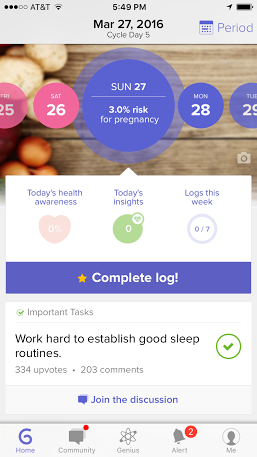

The CEO of Glow too has hinted that their users’ data could potentially be used for insurance assessments. The company say they are committed to reducing premature birth and maternal death but their critics warn that this access could be detrimental to a woman’s career, allowing those with the information to anticipate when she wants to start a family and to increase insurance. However, the company does state that they won’t sell data to third parties.Īccording to The Washington Post, some US employers were incentivising their employees to use versions of the Ovia fertility app that give HR staff access to ‘intimate data’ women input about their cycle. The Wall Street Journal recently reported that period app, Flo had shared its users’ personal data, including period dates and pregnancy plans, with Facebook and other third parties, while Clue’s registered users agree to let Clue use the anonymised information on their cycle to improve the app and to contribute to academic and clinical research. The app has now been updated and they have sealed the loophole but often users, especially younger ones, don’t read the privacy policy and this can differ hugely from app to app. The original Glow app, for example, was found to be vulnerable to hackers who might want to get hold of its users’ data. Data & privacy concerns about smart period technologyĪs with much of the new smart technology, period trackers have stirred up concerns about privacy and the use of personal data. When it comes to anything related to menstruation products or tech that focuses on women’s health, there is still a very definite social taboo in operation, says Clue founder, Ida Tins. Clue Period Tracker, for example, faced huge amounts of initial resistance from male investors. Female tech entrepreneurs still face obstacles in getting the support and funding their male counterparts do, with just 10% of global venture-round funding going to companies founded by women. But while these apps are everywhere now, it hasn’t been an easy journey. Proponents of period apps say they are chipping away at the prejudices and misinformation that prevent women talking and thinking about their menstrual cycle. You can now find smart apps and devices to track anything from fitness to how your baby is developing and the current trend suggests the more we track, the safer we feel. These apps have their fans and their critics but their inclusion in an already crowded tech marketplace points to a rise in the use of data to help us understand ourselves better and improve our lives – the so-called Quantified Self movement. Since 2014, there’s been an explosion in the market and currently 100 million women worldwide use dedicated period tracking apps for health, self awareness, fertility insights and pregnancy planning.

In the early part of the twentieth century, when the infamous rhythm method was popular, a proliferation of graphs, wheels, slide rules and other analogue devices were created by engineers and doctors in an effort to make conception more controllable.īut we’ve come a long way since the 1930s’ tech of Gilbert Tilmore’s cardboard Rythmeter. When the health tracking app, Apple HealthKit launched in 2014 without the functionality to track or record periods there was a sharp and audible intake of breath from at least half of the general public: how was it that such a central part of women’s health had been left out of this supposedly comprehensive health monitoring service?Īfter all, period tracking and period calendars are nothing new. As modern woman is likely to have almost 300 more menstrual cycles in her lifetime than her pre-agricultural society counterpart all that extra flow has given us a lot more to mull over. From the best time to conceive to whether you’re likely to feel bloated at your brother’s wedding next month, the latest period tracker apps are tapping into the wealth of information we can glean not just from the time of the month, but throughout our cycle.Īnd in a way, it’s hardly surprising. In the last few years, however, there has been an outpouring of interest from all quarters in what our periods can tell us (and perhaps more worryingly, tell others – more on that later). At Mooncup we’ve always been fascinated by periods.


 0 kommentar(er)
0 kommentar(er)
